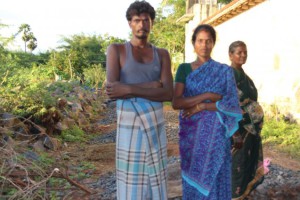It was a rainy Monday morning, Rukmini woke up to some screaming noise coming out from her neighbourhood. She came out of her shanty house and was shocked with what she saw – it was water everywhere and people were running in panic towards the other end of their village. She rushed inside to alert her husband and children. Before they could understand what is happening, their house was in water and the level was increasing very fast. They held each other’s hand and started running towards uplands without thinking about anything else. By the time they reached the other part of the Paleyamsenthakudi village in Chidambaram block of Tamil Nadu’s Thiruvallur district, their house was almost submerged in the flood caused by the second bout of intensive cyclonic rains that wreaked havoc in several parts of the state including the city of Chennai.
“I was very scared when I saw the sea of water coming towards our house. I woke up others and we ran to the other end of the village. We could not able to take away our belongings with us, as the level of water was increasing rapidly,” recounts Rukmini. “We don’t have anything left now, water has taken away everything. Now we are living on charity. But how long?” asks a visibly disturbed a mother of three. “Utensils, clothes and ration card and all other belongings. Everything is gone,” says Rukmini’s husband Deepanathan. “Floods have actually turned us into beggars.” he adds, pausing to take breath. Deepanathan and his family belong to Irula tribes who have traditionally mastered the art of catching rats and snakes which supposedly destroy a quarter of the yield grown annually in Tamil Nadu. Around 30 huts in this Irula settlements in Chidambaram have been washed away in floods and rest have been damaged. Many people had been trapped in the waters. They were rescued by community members using boats.
All those affected were taken to public buildings which were not inundated. They were provided food and other necessary items for over a week. For the Irula tribal community, catching field rats is not only their major source of livelihood but also major source of their protein. According to Deepanathan, they get five rupees for each rat they catch. On a fortunate day they might get to catch around 10 to 20 rats. To make the rats come out of the field, smoke is blown through mouth burning hay in a pot, fixing pot to the rat holes. This is traditionally done by Irula women and many suffer from severe respiratory problems and heart diseases. The men use a traditional weapon with blade at the edge to cut the head of the rat after catching them to avoid them from escaping.
About two years ago, Deepanathan once missed the target and that accident not only cost him his toe but his livelihood as well. “I can go to catch rats even now, I have no problem. But my wife does not allow and I can’t see her coughing and suffering all the time,” says Deepanathan, looking at Rukmini. “I can still remember the sight of my husband’s toe getting cut and falling apart. Then I decided we will never go again,” adds Rukmini, withholding tears in her eyes. Now, Deepanathan and Rukmini do all odd jobs to make their ends meet and to feed a family of five.
They are asked for cleaning drainages in the village and shifting carcasses of animals. If agricultural labourers are in short supply during a fertile yield, they also receive some employment. After doing such hard work for years, their possession was their hut, few articles and books of their children. But unfortunately, water just washed away their lifetime investments. They lost everything with the constant downpour which has brought floods to the low lying areas in the region. Now after water has receded they are back to their villages with a question, how to start from the scratch?
To support our relief and rehabilitation efforts, visit – www.actionaid.org/tamilnadufloods
Edited by Saroj Pattnaik
 Author: Seetha Lakshmi
Author: Seetha Lakshmi




